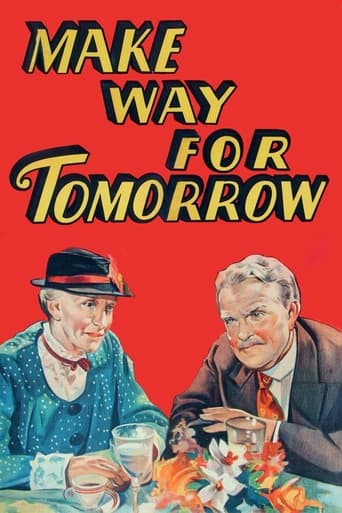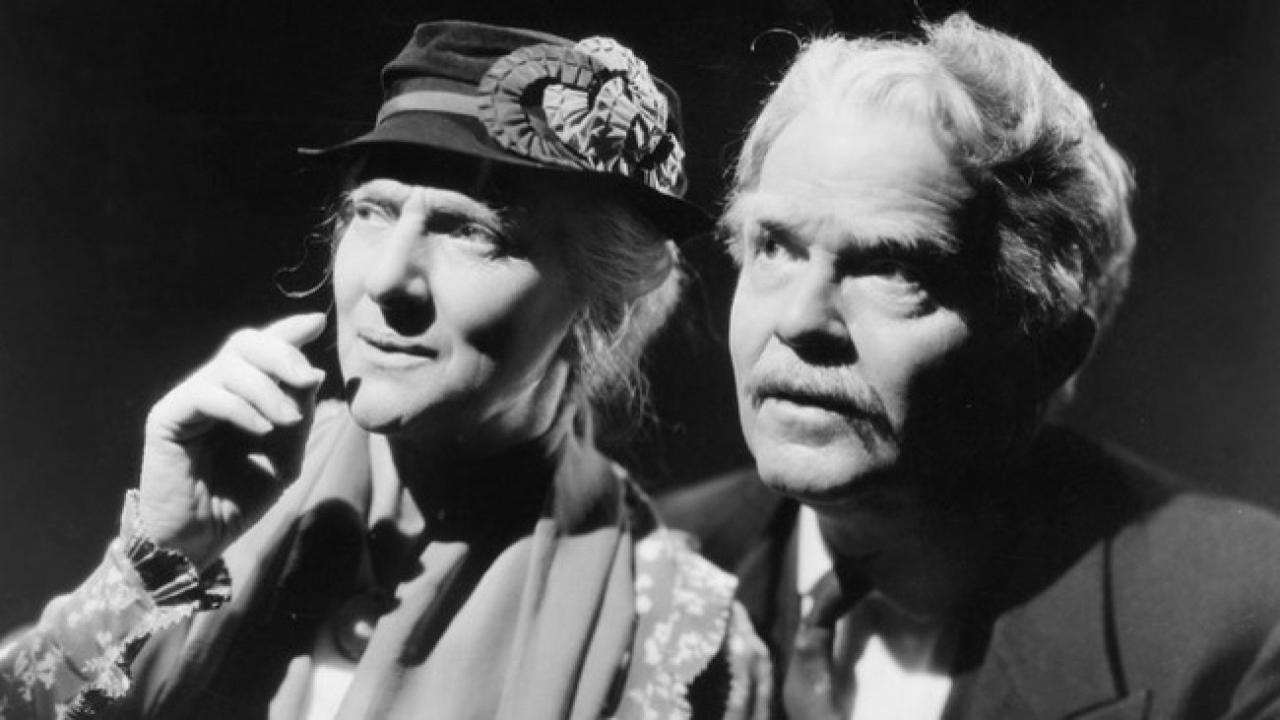sly311
Watched it again this morning, although by chance--TCM had no 'description available' so had I not recognized the film I might have passed it by. Every time I watch I am saddened by the shallowness and callousness of the adult children who can't seem to get over their own 'importance' to lend a hand to their aging parents who at the sunset of their lives are in a real bind. The ending breaks my heart each time I see it. Great movie. Still relevant and still has a lesson to teach whether it be playing bridge or iPhoning. Self-centeredness crosses all time and barriers. Beautiful acting and story line. Who stays together for 50 years anymore?
sharky_55
When four adult children make their yearly (though in reality it is suggested it has been much longer than that) visit to their ageing parents the ritual is a familiar one; the kisses and embraces all round, the gaily singing and cheers, the teasing that has not grown out of them from childhood. It is easy for the four of them to sit through the ordeal because they all know they will be soon back to their normal lives - the ones not burdened by the fussy parents. McCarey has zeroed into this feeling not only in the opening scenes but throughout, displaying it with an uncanny precision. When they sigh at yet another of Mother C's antics, or when they stare daggers at each other whilst George makes the polite offer to cancel their plans on her behalf, or when Cora attempts to sheepishly suggest to the doctor that a little bit of Californian sun might do the trick. The film is so powerful because of the pervasive pretense the characters arm themselves with that is so easy to see through - the final farewell is full of hopeful words and dialogue that assumes another meeting, but we all know that it may very well be their last moment together after so many years of marriage. There are two main drawbacks that hold the film back from being truly timeless and moving. The first is something that may be quite annoying to some particular viewers who are always on the lookout for cinematic realism, for an airtight script with no holes or flimsy characterisations. The film suggests that Barkley and Lucy are indeed wonderful people in their everyday lives, as seen in the final 'date' where everyone they meet is completely courteous and generous towards them - almost as if they are planted there to make the night more magical. The secondary suggestion is that under the stifling care of their children they suddenly become these insufferable, aggravating demons that are little more than mean-spirited exaggerations of the old grumpy person cliché. The humour that is created from these moments are off-putting; the way the room freezes to the repeated creaks of Lucy on the rocking chair (it is baffling how little self-awareness she can show whilst being fully aware of her burden on his son's family - or even worse, she is doing it on purpose), or the little boy antics as Barkley is examined by a doctor, resulting in a juvenile bite. The other lesser drawback is the eagerness of Stone to dissolve away early. A few scenes have their natural reactions cut off prematurely, and are not allowed to fully develop as they might have done so. But the parts that work cut true and deep. Two scene in particular may have many viewers struggling to hold back tears much like the characters within the story also do when witnessing them. They are back to back, and feature both the grandparents hundreds of miles away from each other and yet so close. The phone call rings loudly within the bridge lesson, and McMcaley has used the antics of the obnoxious shouting from Lucy to subvert our expectations. The entire room is expecting something nonsensical and overly loud; instead they are treated to a heartbreaking one-sided monologue where we can feel the depths of Lucy's heart desperately reach through the speaker. The power of the scene allows us to fill in those gaps in the dialogue because we know how deep their love is for each other. Similarly, we can imagine how Lucy has signed off the letter being read out to Barkley. Something sweet and saccharine, we can guess, but it is a master- stroke to allow its ambiguity to hang in the air and create an emotional lull. The sweetest character is Max Rubens, a rare kind and generous friend for the elderly who is so touched he calls back to his mother in the kitchen just to look at her for a little while. He just wants to make sure she is still there, he says. This film will no doubt make more than a few of its viewers do the same thing with their parents.
Jackson Booth-Millard
This black and white film is one I found listed in the book 1001 Movies You Must See Before You Die, it had good ratings and was obviously included in this reference, I hoped for something good, directed by Loe McCarey (Duck Soup, The Awful Truth, An Affair to Remember). Basically elderly couple Barkley "Bark" (Victor Moore) and Lucy Cooper (Beulah Bondi) lose their home after the bank forecloses on the mortgage, they now need a place to live, and they turn to their five adult children. However none of the children will take both them in and they are forced to live separately, this arrangement was supposed to be temporary for three months or until something more permanent can be arranged by the children. Lucy, aka "Ma", goes to live with her son George (Thomas Mitchell), but she always seems to in the way of him and especially his wife Anita Cooper (Fay Bainter) when she is trying to teach her bridge class. Barkley, aka "Pa", goes to live with his daughter Cora Payne (Elisabeth Risdon), but she obviously resents his very presence and arranges for him to go and live with another of his children in California. While all this is going on Lucy and Barkley do their best to maintain their dignity, in the end the couple are parted when Barkley leaves to find a job in California, he says he will send for Lucy, each make a heartfelt statement and reaffirm their lifelong love, but it seems this is almost certainly their final moment together as the train departs. Also starring Porter Hall as Harvey Chase, Barbara Read as Rhoda Cooper and Maurice Moscovitch as Max Rubens. The leading stars as the old and retired married couple who are chucked out their home and slowly broken up are likable, you believe their affection for each other with dances together and stuff, I have to admit I did find myself laughing all that much, there is supposed to be lightness with the sad stuff going on, it is certainly more tearjerking than funny, but that's not a bad thing, I didn't fully get into perhaps, but it is a worthwhile enough comedy drama. Good!
Sergeant_Tibbs
This is a rare treat. Leo McCarey says that his Oscar for The Awful Truth, won in 1937, was really for Make Way For Tomorrow. I can see why, this film is leagues beyond his other films I've seen. It's a heart-breaking situation. An old couple torn away from each other. It's the saddest image. They've spent their whole life together but can't spend their last years. For a film in this era, Make Way For Tomorrow is remarkably sensitive to the situation. There's such elegance in the way the characters are treated, and it's thanks to Victor Moore and especially Beulah Bondi honest and delicate performances. It's a shame that the plot is mostly full of such triviality during their endeavours at their respective separate homes. It feels like there could've been something deeper to explore here, and they were nearly there. They arrive at the end - and the film's final passage is the definition of poignance as they spend their last hours together. Although it's still full of unfortunate irreverence, its emotional urgency cuts to the core. If only it was a little more focused, a little more consistent, with another handful of those irrevocably poignant moments that hit you near its end then it would be a favourite. It's as close as you can get otherwise.8/10


 AD
AD




